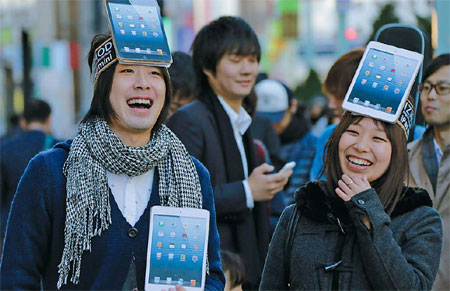Low-key start for iPad mini
|
Customers Kota Suzuki, left, and Mio Kawai wait in line to buy Apple's iPad mini at a store in Tokyo on Friday. About 300 people lined up outside Apple's flagship store in the Japanese capital for the new, smaller version of the iPad tablet. Koji Sasahara / AP |
The iPad mini got off to a low-key start on Friday, with little of the hype-fueled razzmatazz of earlier Apple launches, as analysts said the costly creation may have come too late to the 7-inch market.
Around 300 people lined up outside Apple's flagship store in Tokyo, some wearing fancy dress, to get their hands on a device the company insists is more than just a shrunken version of its popular tablet.
At least 20 people spent the night outside the shop in the Ginza area, but the launch was missing some of the pizzazz of earlier offerings, with the line quickly dissipating after an initial rush.
In tech-mad Singapore, numbers were significantly lower compared with previous launches, which have seen several hundred fans camp out. In Hong Kong, around 30 people lined up to pick up their pre-ordered devices before the Apple store opened.
It was a similar story in Sydney, where there was nothing like the days-long lines for the new generation iPhone 5.
"Looks like most ordered it online," one person in the small line told reporters.
Nevertheless, fans declared themselves impressed by the physical charms of the 7.9 inch touchscreen device.
"It's completely different (from the regular iPad)," said Ayano in Tokyo, who did not give her surname.
"It is thinner and very light. Look, you can hold it in one hand."
Around three dozen markets in Asia and Europe, as well as the United States, were due to see launches of the WiFi-only version on Friday.
In Seoul, more than 200 fans, including some who had camped out overnight, had their patience rewarded at 8 am, with one man saying that Apple products are a better buy for his 4-year-old daughter.
"I prefer iPad to Android devices because it has more content for children such as my daughter," he said.
Die-hard fans noted there was less of a fanfare this time around.
"It's not surprising for people to wait for hours to be the first to get new Apple devices, but now the hype doesn't seem to be as big as before," said Kim Tae-min.
Ahead of the launch, analysts had warned the starting price of $329 might seem steep to budget-minded shoppers who can buy Google Nexus or Amazon Kindle tablets for $199.
"Devotion to Apple products has been compared to a religion," said an analyst from the US-based company Gartner.
"But, I don't think Apple will be as dominant in the 7-inch tablet space because they let the Kindle Fire and the Nexus get a foothold in the market at a considerably lower price."
Mark Ranson, associate analyst at global technology research company Ovum, said the iPad mini marked something of a departure, because it was an instance of Apple following the crowd, rather than setting the pace.
"This reactive nature of the iPad mini launch was largely the cause of the more muted public response," he said.
Ranson said increasing competition was squeezing Apple.
"It has become very difficult to create new form factors in the smart-device market, and increasingly, we are seeing incremental changes in device specifications (rather) than new product categories altogether.
"Samsung's continued growth, Google's further push into the device market with its Nexus line of products, and the strong performance of Amazon's Kindle Fire are all conspiring to bridge the gap between Apple and its competitors."
Apple's senior vice-president for marketing Phil Schiller helped unveil the iPad mini last week, saying it was an entirely new design and not "just a shrunken-down iPad".
Schiller said the iPad mini weighs 0.31 kilograms, less than half the original, and is 7.2 millimeters thick.
Like later versions of the original iPad, the new Apple tablet also features rear- and front-facing cameras. It also has stereo speakers.
The launch came after British judges told Apple it had to rewrite an "inaccurate" statement relating to its patent dispute with South Korean rival Samsung.
The company was told last month to post a message on its website saying Samsung's Galaxy tablet computers had not infringed iPad designs.
But Samsung complained that the message did not comply with the court order because it included comments on other rulings in Germany and the United States, which had favored Apple.
Agence France-Presse



















